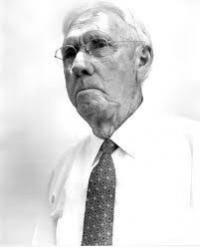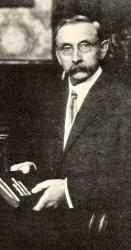
1881 - 1973 Person Name: A. T. Arranger of "[All praise to Him who reigns above]" in Songs of the Reapers Austin Taylor (October 14, 1881 – January 1, 1973) Austin Taylor was born October 14, 1881 in Morgantown, Kentucky. He served Churches of Christ, one of three branches of the Stone-Campbell Movement for all of his long life as a song writer, song leader, minister, preacher, teacher, and singing school leader. The school he helped to found, the Texas Normal Singing School, still holds its camp every Summer.
The Taylors moved to Sherman, TX in 1890. There Austin began his music career as a singing school teacher and song writer. Two of his outstanding teachers were Horatio Richmond Palmer (1834-1907) of New York, who wrote songs such as “Master the Tempest is Raging,” “Angry Words,” and “O Lord, Our Lord,” and Dr. Horace Neely Lincoln (1859-1948) of St. Louis who specialized in lyrics.
His first song book, “The Gospel Messenger,” was published in 1905. He has published some twenty-five song books, just for [the] Firm Foundation in Austin, TX. His songs can be found in some fifty plus songbooks. Practically all the song books published by members of the church contain “Closer to Thee” and “Do All In the Name of the Lord.”
In the early part of the 1900’s churches received their musical instruction by singing conventions. Taylor continued teaching of singing conventions and influenced many students to follow. Some of his students began the Hartford Music Company in Nacogdoches, TX. Albert Brumley became a student of the Hartford school and later bought out the company. Austin Taylor paid the way for Will Slater to go with him to some of his schools. Slater later became a publisher and had his business in Fort Worth, TX. Frank Grammer, another student of Austin Taylor’s, founded a publishing company in California. Teaching conventions and singing for gospel meetings and revivals was a full-time career for Taylor.
Austin Taylor had created a good reputation for himself on the circuit of the singing conventions, so he started receiving many invitations to lead singing for gospel meetings. For many years this became one of his main works. In 1911 Austin Taylor was appointed as music editor of the Firm Foundation Publishing Co. operated by G. H. P. Showalter. The majority of his song books were sold between 1910 and 1930. They were printed in Cincinnati. In 1914 he published Gospel Songs No. 2 for the Firm Foundation. It sold over 500,000 in one year. There were nearly one million of the paperback copies sold in a 15-year period. Taylor published over 50 different hymn books in his lifetime, many at his own expense.
Edited by D. J. Bulls, from James Tackett, paperlesshymnal.com; "A Song is Born," Robert Taylor (2004 Taylor Publications);m "Our Garden of Song," Gene C. Finley (1980, Howard Publishing Co.) "The Songs of Austin Taylor," John R. Furr (Texas Normal Singing School), additional editing by Dianne Shapiro)
Austin Taylor


 My Starred Hymns
My Starred Hymns





